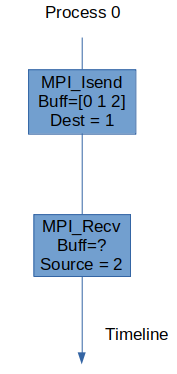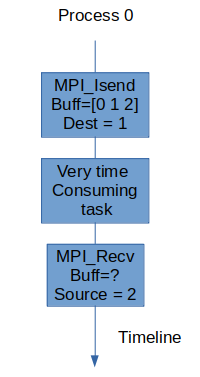Definition
When a buffer, which is involved in an uncompleted non-blocking communication, is used in another communication, there will be a race to read and write the buffer. The outcome of this situation is undefined. That is why the MPI standard states that a buffer must not be reused unless its communication is completed. It might look acceptable that multiple communications only read a buffer, however, it is still illegal in the MPI.
Example
In the example below, process 0 sends buff0 in a non-blocking way to another process, it immediately moves forward to fill the buffer with data coming from another process. MPI_Isend can complete before, during or after the MPI_recv, therefore there is a race of reading and writing on buff0. To avoid this, we have two solutions: first using different buffers for MPI_Isend and MPI_Recv, and second, waiting for MPI_Isend to complete with the aid of MPI_Wait.

Always check non-blocking communication
Let’s modify the previous example in a way that after MPI_Isend a very time-consuming task happens. Let’s say we are sure that MPI_Isend has time to complete during the task, is it OK to reuse the buffer in another communication afterward? Nope, we Must check the completion of MPI_Isend using MPI_Wait or MPI_Test.

Code
Let’s create a code to examine the previous rule. Rank 0 sends buffer=2 to rank 1 which receives it using MPI_Irecv. Then the threads are put in sleep for 2 seconds to mimic a time-consuming task.
#include <mpi.h>
#include <chrono>
#include <thread>
#include <stdio.h>
using namespace std;
int main(){
MPI_Init(NULL, NULL);
int rank;
MPI_Comm_rank(MPI_COMM_WORLD, &rank);
MPI_Request req;
MPI_Status stat;
int sendbuf = 2;
int recvbuf = 3;
if (rank == 0){
MPI_Isend( &sendbuf, 1, MPI_INT, 1, 0, MPI_COMM_WORLD, &req);
std::this_thread::sleep_for(std::chrono::milliseconds(2000));
cout<< "Rank"<< rank<< " sendbuf="<< sendbuf<< endl;
}
if (rank==1){
MPI_Irecv( &recvbuf, 1, MPI_INT, 0, 0, MPI_COMM_WORLD, &req);
std::this_thread::sleep_for(std::chrono::milliseconds(2000));
int result = 0;
// MPI_Test( &req, &result , &stat);
cout<<"Rank"<< rank <<
" recvbuf="<< recvbuf <<
" success:"<< (result?"Yes":"No")
<<endl;
}
MPI_Finalize();
}
We expect within two seconds the data transfer happens, and the content of recvbuf to be 2, but we see the below outcome:
Rank0 sendbuf=2
Rank1 recvbuf=3 success:No
Now we uncomment the MPI_Test line, and run the code, we get
Rank0 sendbuf=2
Rank1 recvbuf=2 success:Yes
Therefore, always call MPI_Test or MPI_Wait before reusing the buffer of non-blocking communications without any exception.
References
I got ideas and codes from the below website(s)
OpenMPI CodingGame Stackoverflow
